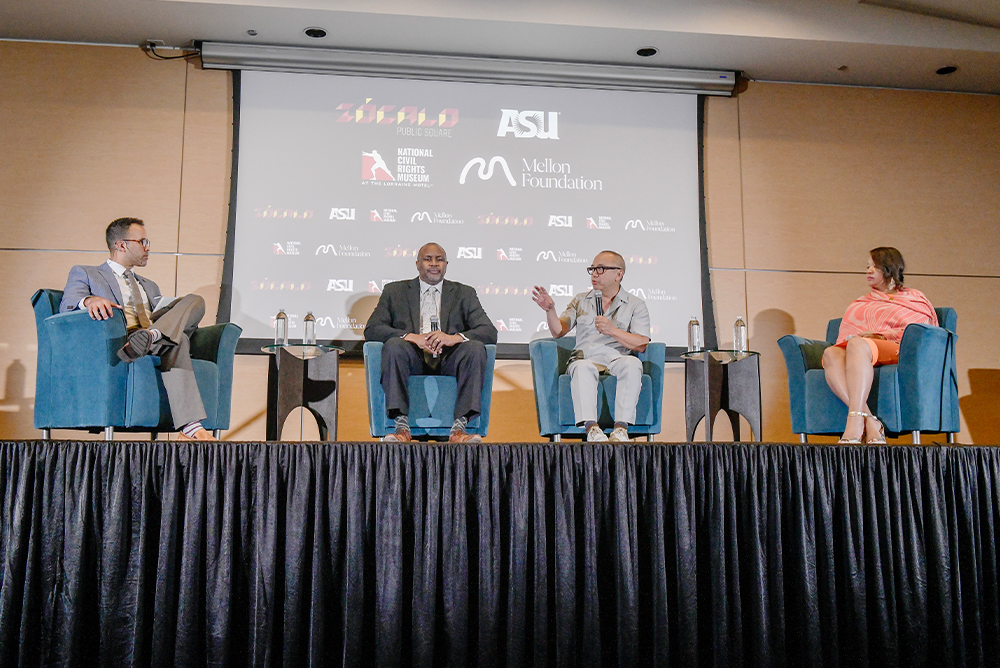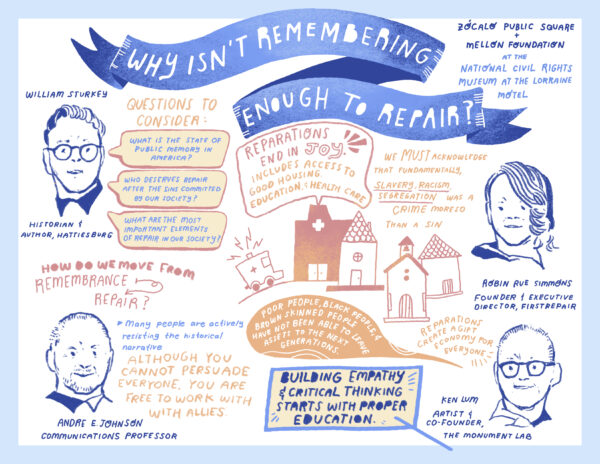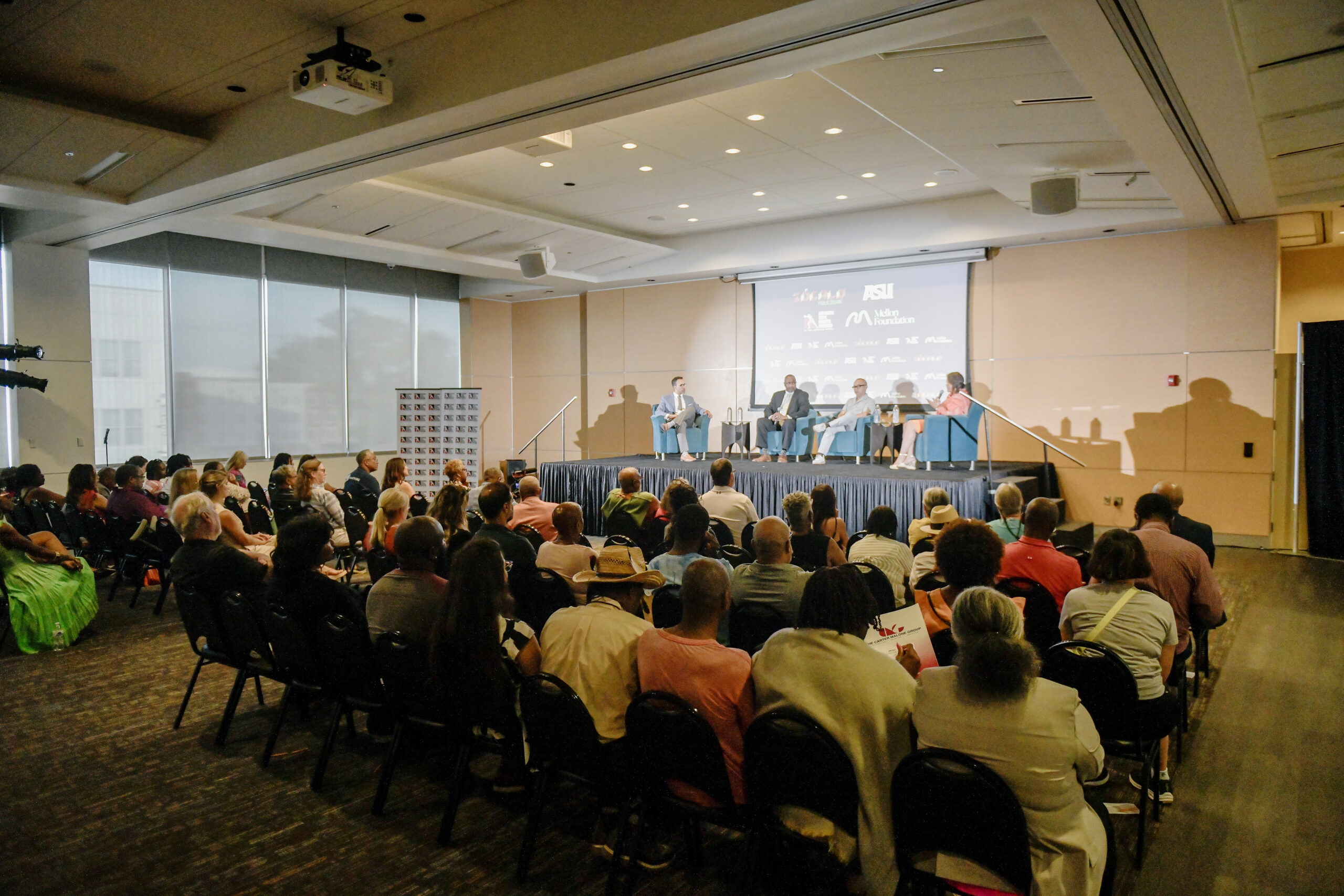
Left to right: William Sturkey, Andre E. Johnson, Ken Lum, and Robin Rue Simmons.
The Lorraine Motel in downtown Memphis, just blocks away from Beale Street, the city’s historic African American commercial center, first opened as a whites-only establishment in the 1920s. But just two decades later, when it was bought and repurposed by Black business owners, it went from an institution that banned African American patrons to one that was embraced as a safe haven by those very same travelers seeking dignified lodgings in the Jim Crow South.
People like Aretha Franklin, Ray Charles, and Nat King Cole found hospitality there. So did Dr. Martin Luther King, Jr., who was shot and killed there while working on the Poor People’s Campaign in 1968. Today, Memphis locals have turned the Lorraine into the National Civil Rights Museum, a living monument to the twin legacies of racism and resistance its walls have witnessed over the last century.
Zócalo came to the Lorraine this week to hold the third public program in our two-year events and editorial series, “How Should Societies Remember Their Sins?,” presented in partnership with the Mellon Foundation.
“We are gathered at a site of history,” historian and series moderator William Sturkey said, addressing the audience in Memphis and those watching around the world on the live stream.
“We remember MLK and other leaders of this movement.” But memory is not enough, he said, pointing to deep divides in the nation.
During the night, panelists, who included a reparations leader, an artist, and a rhetorician, considered this question: “Why isn’t remembering enough to repair?”
Their answers spoke to reckonings the United States still needs to face—but also spoke to progress: The country’s most oppressed peoples are reclaiming historical narratives, and engaging in an emerging reparations movement that, panelists argued, can help the whole nation heal.
Sturkey began the night by asking the group to assess the state of public memory in America.
“Memory is highly fractured right now,” said artist Ken Lum, chair of fine arts at the University of Pennsylvania’s Weitzman School of Design and co-founder of the Monument Lab, a public art and history project based in Philadelphia. “There’s no consensus even how history unfolded and even how history should be written about.”
But that’s a good thing, Lum said, “because history is written by those with power over the subjugated.” Today, as the groups most dominated and exploited are in positions to tell their versions of events, longstanding historical myths are being challenged. It’s this moment of transition—however painful it is—that allows for greater truths to surface.
Robin Rue Simmons, founder and executive director of the nonprofit First Repair, which promotes local reparations policies around the country to help Black Americans secure financial redress, agreed. “Although we have so much to be discouraged about,” she said that when it comes to “what we’re seeing in school systems and legislatures,” she takes attempts by extremists to silence the most subjugated voices as “evidence we’re pushing the needle and making progress.”
“I’ll remain encouraged and hopeful,” Simmons said.
Andre E. Johnson, the Benjamin W. Rawlins Professor of Communication at the University of Memphis, observed that many people are not misremembering but “actively trying to resist” the historical narrative. That’s the problem, he said. “How do we move from remembering to repair if we cannot come to grips with the history if we actively refuse to accept it and live in it? We’ll always be right here spinning our wheels.”
“Who needs repair? Who deserves repair after the sins committed by our society?” asked Sturkey.
“Who is due,” said Simmons. “If you were harmed in America by this government then you are due reparations.”
“All people who did not get due process because it was baked in the law,” Johnson agreed.
“There are basic statistics that tell you,” said Lum. “Who was not able to bestow assets to the next generations? Which areas have seen persistent disinvestment going back centuries? … Poor people, Black people, brown-skinned people… statistically, all of that is available in quantitative measures.”
“Let’s hope and dream,” Sturkey ventured next. “What are the most important elements of repair in our society? What would that look like?
“For me, reparations would end in joy,” said Simmons. “Whatever joy is. Rest, empowerment, legacy. In my case rooted around land and access to housing and education.” But it is for Black residents in each locality to think about what it should be, she added. “If I had it my way, Black folks would prescribe how to repair.”
Simmons, who led the first government-funded reparations legislation in her hometown of Evanston, Illinois, spoke about the huge psychological benefit Black residents in Evanston felt when the city recently passed its reparations initiative. “To actually be able to give a resident a check for $25,000 and an apology, what we hear from them—I can’t get through talking about it without crying.”
That’s the gift economy, said Lum. It’s a positive for everyone—not only people who receive reparations. For communities funding these programs, “you’re becoming a part of the community, showing concern for others. You’re gifting because you’ve been gifted by others who were enslaved.”
To advance this, Lum calls for a “wholesale reinvigoration of public schools” that will help build an empathetic, critical-thinking populace. “This is a generational process that starts with proper education.”
Johnson, who is both a rhetoric professor and a pastor, also brought up the importance of living in “safe, shalom communities.” The Hebrew word shalom stands for health, safety, prosperity, peace, friendship, and well-being. “That’s what we’re talking about right here in Memphis,” he said. “People just want to go to sleep peacefully.”
Sturkey asked Johnson if he had a strategy to affect change through speech today. Johnson said that history has shown that there isn’t one. “There are some audiences you will never persuade,” he said. “Once you accept that, you are free. You are free to work with the allies you have.”
During the end of the program, panelists answered audience questions, including one from a doctoral student in philosophy, who asked: How do we deal with the overarching myths that become the enemies to repair?
Myths are always changing, answered Lum, but the one thing that doesn’t change is that myths are there to maintain power structures. That’s what we’re working against, he said.






Send A Letter To the Editors